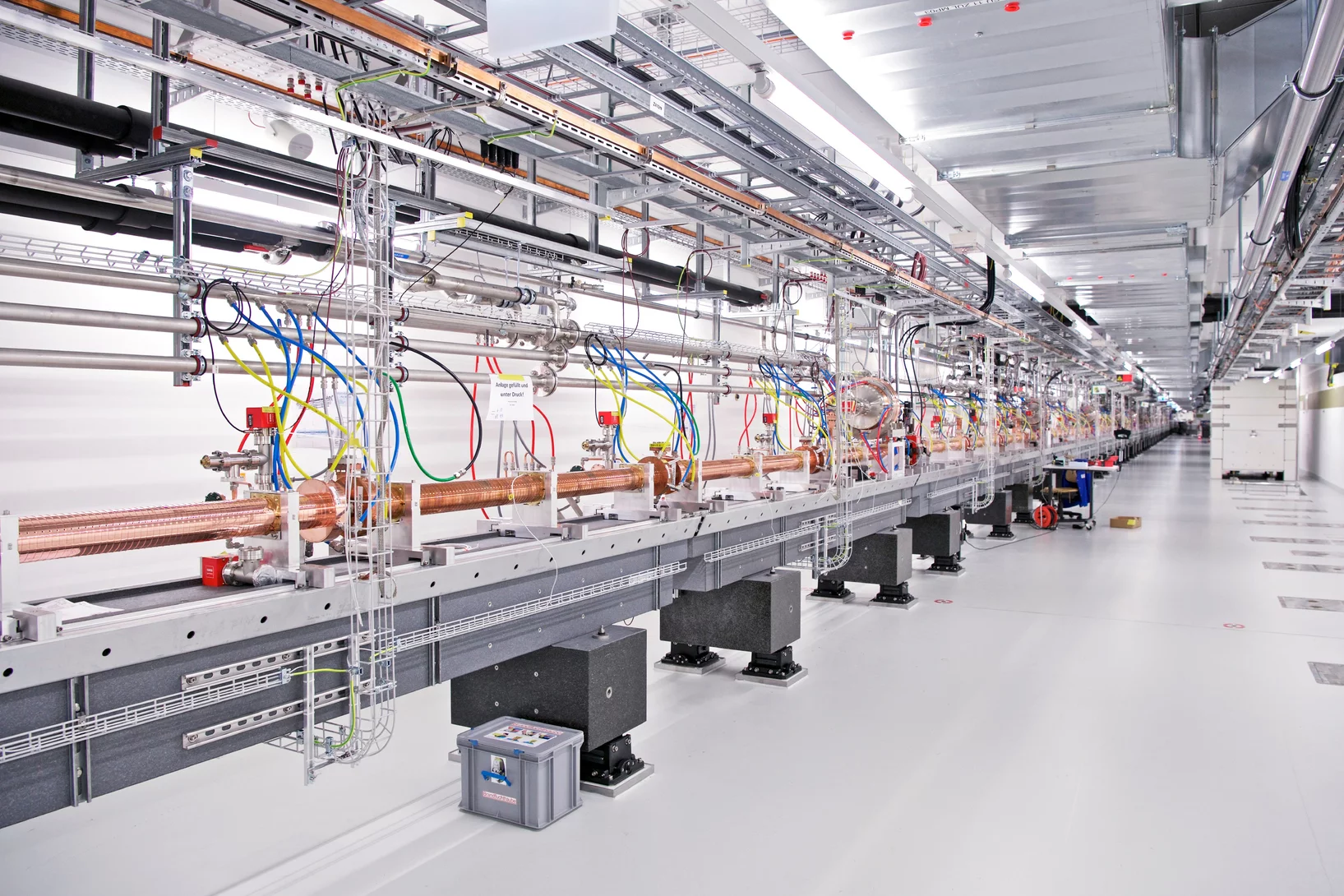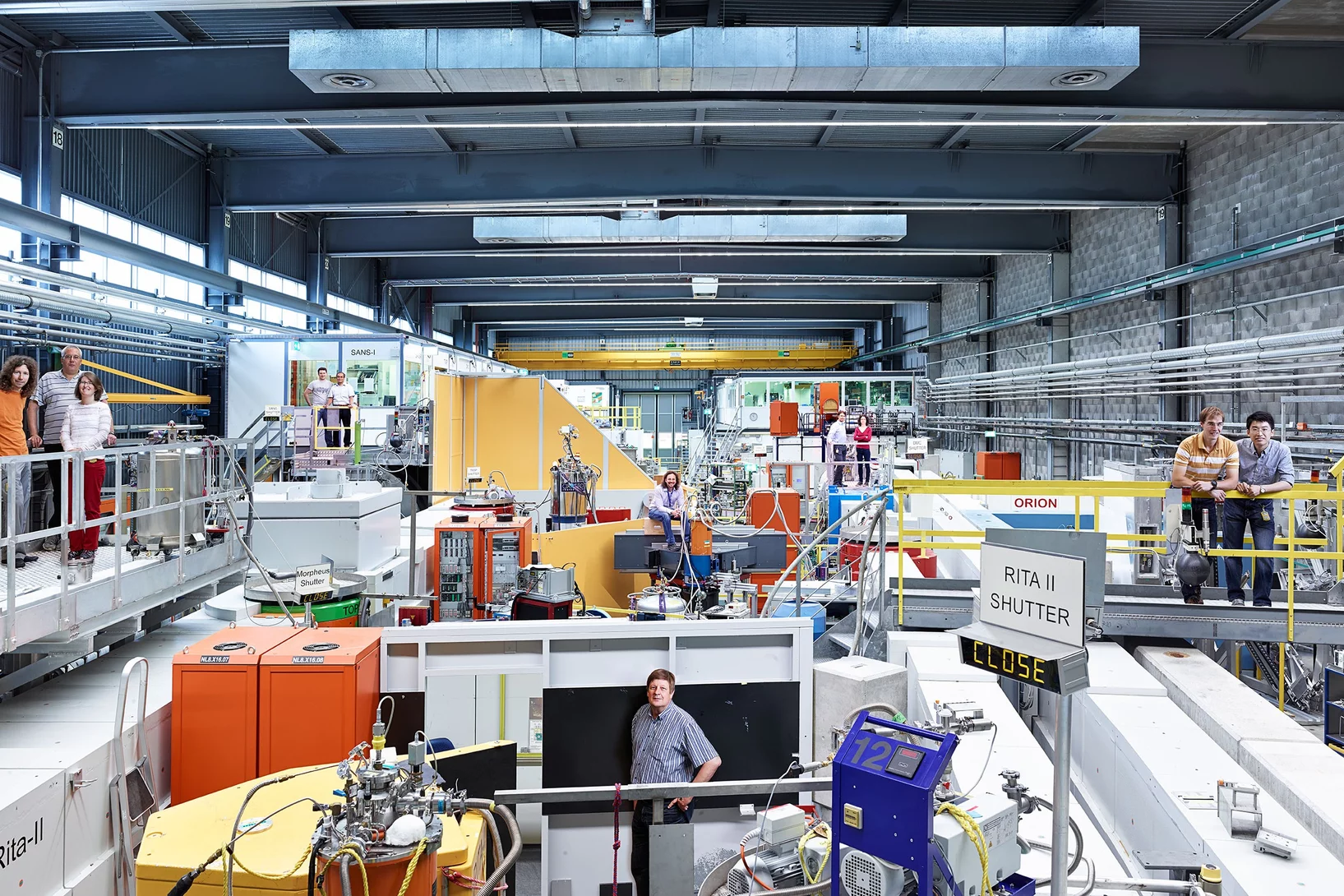A l’Institut Paul Scherrer, les scientifiques cherchent des réponses à la question essentielle des structures élémentaires de la matière et des principes fondamentaux de fonctionnement dans la nature. Ils étudient la structure et les propriétés des particules élémentaires – les plus petits composants de la matière – ou se penchent sur la question de savoir comment les molécules biologiques sont structurées et remplissent leur fonction. Les connaissances qu’ils acquièrent de la sorte ouvrent de nouvelles pistes de solution en sciences, en médecine ou dans le domaine des technologies.
Pour en savoir plus, reportez-vous à Aperçu Fondements de la nature
Visite publique radiopharmacie
Plongez dans le monde fascinant de la radiopharmacie à l'Institut Paul Scherrer. Découvrez comment des substances radioactives sont utilisées pour le diagnostic et le traitement de maladies graves comme le cancer.
Visite publique du Laboratoire Chaud
Découvrez lors de notre visite guidée l’installation nucléaire du Laboratoire Chaud, une installation expérimentale unique en Suisse pour l’étude et l’analyse de matériaux hautement radioactifs dans le domaine de la technologie nucléaire. Une infrastructure bien développée en termes de sécurité, d'analyse et de préparation, ainsi que des laboratoires uniques sont à votre disposition.
Visite publique du SwissFEL
Le SwissFEL est l'une des cinq installations de lasers à rayons X au monde capables de produire des rayons X durs de qualité laser et de les mettre à disposition pour la recherche. Lors de notre visite guidée, nous découvrirons le fonctionnement et les principaux objectifs de recherche de ce laser à rayons X, puis nous ferons une visite pour observer de près les composants clés de l'installation longue de 700 mètres.
100 Tage als Mediamatik-Lernender am PSI
Als Mediamatiker helfe ich die Internetseite zu pflegen, auf Social Media zu posten sowie Fotos und Videos zu bearbeiten. In den ersten 100 Tagen meiner Lehre am PSI konnte ich schon viele grossartige Erfahrungen machen.
Les câbles de la SLS
Technique du bâtiment, aimants, informatique: de nombreux groupes participent à la mise à niveau de la SLS. Ils sont reliés entre eux par plusieurs centaines de kilomètres de câbles.
Décision concernant IMPACT: la mise à niveau de l’installation de recherche du PSI sera réalisée
Le financement des transformations à l’accélérateur de protons du PSI a été avalisé par le Parlement suisse.
Fractional quasiparticles in three dimensions
Specific signatures of fractionalization have been observed in a three-dimensional system known as quantum spin ice.
Mapping the Nanoscale Architecture of Functional Materials
A new X-ray technique reveals the 3D orientation of ordered material structures at the nanoscale, allowing new insights into material functionality.
Exotics among the atoms
Muon experiments at the PSI are focusing on different isotopes.
Together for Science with Neutrons, Muons and X-rays
Strategic partnership between research facilities in UK and Switzerland will create new capabilities to address global challenges using neutrons, muons and X-rays.
ANAXAM célèbre son 5e anniversaire
Nous félicitons chaleureusement ANAXAM pour son cinquième anniversaire!
Depuis sa création en 2019, ANAXAM s’est imposé comme un partenaire fiable pour l’industrie, offrant des solutions innovantes en analyse appliquée des matériaux.
Jahresschlussapéro 2024
Ein erfolgreiches Berufsjahr geht zu Ende
Brigitte Decrausaz receives DECTRIS Award of Best Master's Thesis in Experimental Physics at UZH
Brigitte Decrausaz, PhD student at LNS, received the DECTRIS Award 2023/2024 for the Best Master's Thesis in Experimental Physics at the University of Zürich.
Vers un trafic routier faiblement émetteur de dioxyde de carbone
Des scientifiques de l’Institut Paul Scherrer PSI montrent comment une intégration habile des énergies renouvelables permettrait de décarboniser le trafic routier.
Not Rocket Science, just Nuclear Rocket Science
The PSI Laboratory for Reactor Physics and Thermal-Hydraulics (LRT) conducts computational and experimental research with focus on the safety of nuclear reactors and systems. In recent years, it established the EPSILON program to coordinate and consolidate its research activities on nuclear space applications. Among other things, developments were initiated towards an open-source European platform for high-fidelity simulations and experiments dedicated to space nuclear reactors. Referred to as the openSPACE platform, its underlying concepts are a) to include not only solvers but also reference simulation models as well as experimental validation data; b) to make all of these available to the broader and combined nuclear- and space communities for usage and/or further developments. Through this, the goal is thus not only to facilitate collaborative research in this area but also to enable effective support to the European Space Agency for thorough design, safety and performance evaluations of nuclear reactor systems for in-space propulsion and/or surface power. A first development phase focused on nuclear electric propulsion was proposed and retained among the two projects selected in 2023 by the Swiss National Science Foundation (SNSF) for its MARVIS call (Multidisciplinary Advanced Research Ventures in Space) and funded by the Swiss Secretariat for Research and Innovation (SERI). This project, to be conducted via four inter-connected PhD theses, was launched in October 2024 and this marks thus a key milestone for the propulsion of PSI nuclear research towards space.
Scientist careers: Kaoutar Radi, participant of CONNECT Round 5, now Technical Project Manager in the development team of Hilti's Diamond Business Unit
The CONNECT program fosters exchange between highly qualified and ambitious female scientists and role models working in industry. In addition to direct matches between program participants and partner companies, the program encourages scientists to explore and pursue career options beyond academia. Every year, ca. 35 scientists and 3-4 partner companies, plus the federal administration, sponsors, universities of applied sciences and startups benefit from the program. In today's post, meet Kaoutar Radi who participated in CONNECT Round 5 and got encouraged to continue her career at Hilti, one of our partner companies. She tells us about her journey from wanting to explore potential career paths, to the connection she felt during the visit at Hilti, and her current role as technical project manager in the development team at Hilti's Diamond Business Unit.
Origin of the Suppression of Magnetic Order in MnSi under Hydrostatic Pressure
We experimentally study the evolution of the magnetic moment 𝑚 and exchange interaction 𝐽 as a function of hydrostatic pressure in the zero-field helimagnetic phase of the strongly correlated electron system MnSi. The suppression of magnetic order at ≈1.5 GPa is shown to arise from the 𝐽 collapse and not from a quantum fluctuations induced reduction of 𝑚. Our work provides benchmarks ...
Preparing the Future of PSI Large Facilities in Atmospheric Research
The Multiphase Chemistry Group in the Laboratory of Atmospheric Chemistry (LAC) looks back to a nearly 20 years record of activities with in situ X-ray photoelectron spectroscopy (XPS) and in situ scanning transmission X-ray spectromicroscopy (STXM) to address key fundamental questions in atmospheric chemistry. This is the time to consider new horizons, align with current and future needs in atmospheric sciences, and to identify novel opportunities driven by upcoming trends in methods, technologies and facilities. This has been the topic of the Workshop ‘X-ray and Neutron Spectroscopy, Scattering and Imaging in Atmospheric Chemistry’, held at PSI 13 – 15 November 2024.
Anionic Disorder and Its Impact on the Surface Electronic Structure of Oxynitride Photoactive Semiconductors
The conversion of solar energy into chemical energy, stored in the form of hydrogen, bears enormous potential as a sustainable fuel for powering emerging technologies. Photoactive oxynitrides are promising materials for splitting water into molecular oxygen and hydrogen. However, one of the issues limiting widespread commercial use of oxynitrides is degradation during operation. While recent studies have shown the loss of nitrogen, its relation to reduced efficiency has not been directly and systematically addressed with experiments. In this study, we demonstrate the impact of the anionic stoichiometry of BaTaOxNy on its electronic structure and functional properties. Through experimental ion scattering, electron microscopy, and photoelectron spectroscopy investigations, we determine the anionic composition ranging from the bulk toward the surface of BaTaOxNy thin films. This further serves as input for band structure computations modeling the substitutional disorder of the anion sites. Combining our experimental and computational approaches, we reveal the depth-dependent elemental composition of oxynitride films, resulting in downward band bending and the loss of semiconducting character toward the surface. Extending beyond idealized systems, we demonstrate the relation between the electronic properties of real oxynitride photoanodes and their performance, providing guidelines for engineering highly efficient photoelectrodes and photocatalysts for clean hydrogen production.
IMPACT: pour la société suisse
Pour être à la pointe, au niveau mondial, dans le domaine des muons et de la production de radionucléides médicaux: l'importance de la mise à niveau prévue.
Nanolino, die neue PSI-Kita ist eröffnet
Die Kita-Kids sind wieder auf den PSI-Campus und wir überraschten sie mit Spielgeräten aber auch mit viel Staub.
Operando phase mapping in multi-material laser powder bed fusion
Additive manufacturing (AM) or “3D printing” of metals, which builds structure layer by layer, has revolutionized the production of intricate 3D designs. Among its techniques, laser powder bed fusion (PBF-LB) excels in creating metallic parts with intricate designs and high precision. This process can combine different metals into innovative multi-material components with tailored properties, with regards to e.g., strength and thermal conductivity, surpassing the capabilities of single-material designs. However, ....
Acoustic emission signature of a martensitic transformation
Acoustic emission monitoring in 3D printing: real-time insights into martensitic phase transformations and crack formation.
Mein erster Kunde im Zentrallager
Der Kunde ist König!
A bord du laboratoire volant
La Centrale nationale d’alarme (CENAL) effectue, chaque année, des vols de mesure avec le soutien du PSI. Objectif: déterminer la situation radiologique en Suisse.
Spannende Momente vom Nationalen Zukunftstag am PSI
Die nächste Generation von Fachkräften am PSI und hat einen unvergesslichen Zukunftstag erlebt!
Neat, precise and brighter than ever
Researchers at SwissFEL succeed in improving the temporal coherence of XFEL pulses
SμS call for proposals I-25 is still open
The call for SμS proposals I-25 is still open. Submission deadline: 01 December 2024
SINQ call for proposals is closed now
The recent SINQ call I-25 was closed on 15 November 2024. More than 230 new proposals were received.
Exact solution of the classical and quantum Heisenberg mean field spin glasses
We solve and elucidate the physics of quantum Heisenberg spins glasses, which governs the local moments in randomly doped, strongly correlated materials.






























